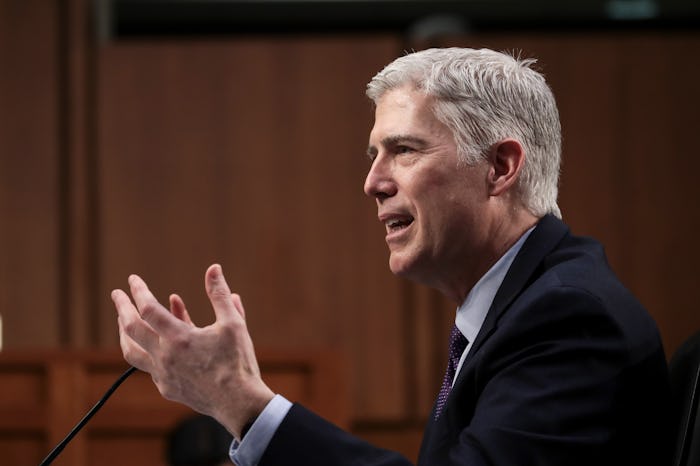News

How Long Can Democrats Filibuster Neil Gorsuch?
On Thursday, as committee hearings on Judge Neil Gorsuch wrapped up, Senate Democrats said they would filibuster Gorsuch's nomination to the Supreme Court. According to The New York Times, Gorsuch would need the votes of at least eight Democrats in order to make it to the Supreme Court, and those are votes that he is unlikely to receive at the moment. But realistically, how long can Democrats filibuster Neil Gorsuch before a decision has to be made?
First, it helps to understand what a filibuster is: it's essentially a move that lets the Senate's minority party (at the moment, Democrats) have a little more power. Usually, a Supreme Court pick requires only a majority vote (51 votes) in order to pass. However, there are 52 Republicans in the Senate at the moment, so Gorsuch could be confirmed without approval from a single Democrat. The solution? A filibuster, which essentially presses pause in the Senate. Once a senator calls for a filibuster, members of the Senate must talk it out until a total of 60 Senators vote to end the debate and move on to a final vote. (After that, only 51 votes are needed for confirmation.)
The thing is, filibusters usually include a lot of talking, delaying, and very little actual decision-making. For instance, remember Judge Merrick Garland's nomination to the Supreme Court? That was filibustered for 10 months by Republicans, who chose to wait out the rest of President Obama's term rather than allow Democrats to confirm Garland.
Considering the filibuster block of Garland, Republicans weren't exactly surprised when Senate Minority Leader Chuck Shumer announced his intention to lead a filibuster against Gorsuch. Since there's no limit to how long a filibuster can last, Republicans could be waiting a long while before eight Democrats decided to join them.
That said, the chances of this filibuster being carried out indefinitely is unlikely, since Republicans could pursue the "nuclear option" in order to break through Democrats' stonewalling. According to The New York Times, both Senate Majority Leader Mitch McConnell and President Donald Trump have expressed support for the idea of eliminating the filibuster option if Democrats decide to block Gorsuch's confirmation.
If Senate Republicans do agree and decide to "go nuclear," they could eliminate senators' ability to filibuster Supreme Court nominations, ending Democrats' filibuster of Gorsuch. Considering that Supreme Court appointments are for life, it's a decision that would probably give Republicans the upper hand in the Supreme Court for quite a while.